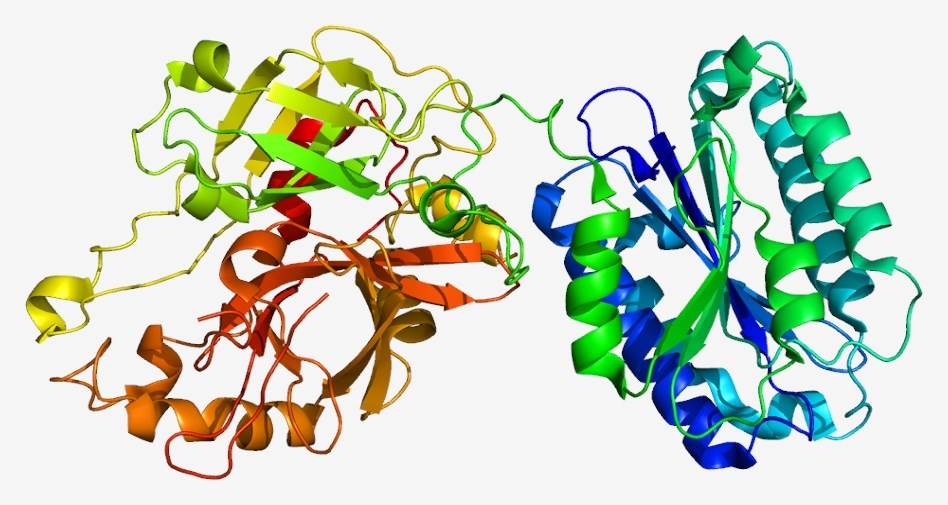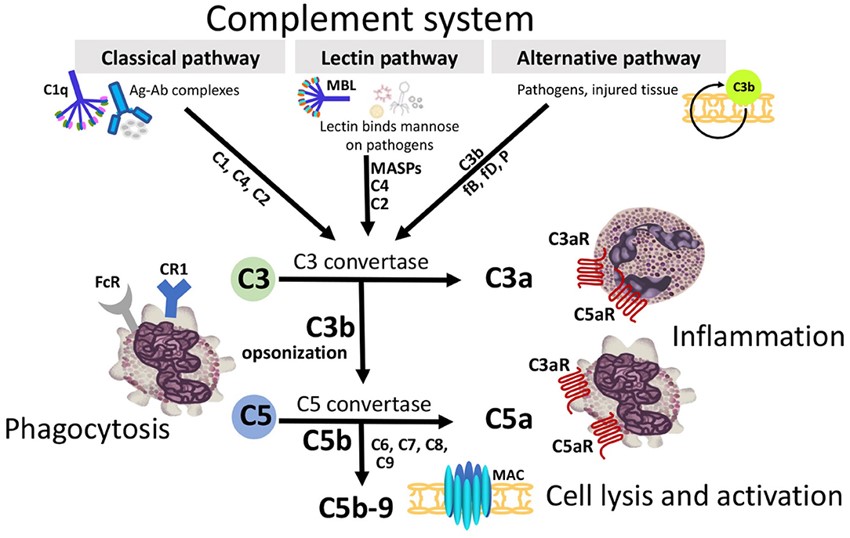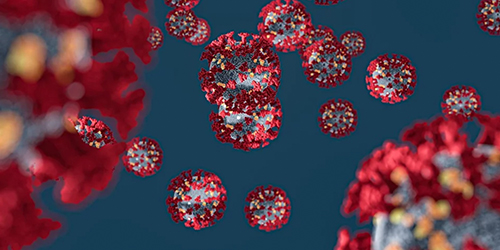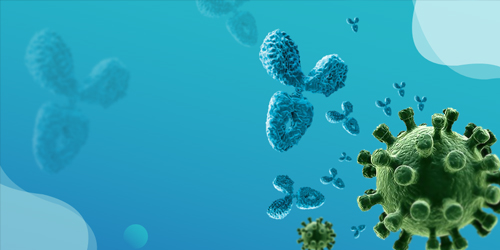Product List Background C2 Functional Service Application Related Service FAQ Resources
Background
Complement C2 is an important protein in the complement system which regulates the complement activation of
classical and MBL pathways. C2 can bind to membrane-bound C4b and is then cleaved by C1s or MASP2, forming C2b and
C4bC2a (a C3-convertase). This is a key step in complement activation. C3 proteins are cleaved by C3 convertase and
lead to the generation of crucial effector molecules – C3a and C3b. Besides, C2 is related to first-line defense
against microbial infection that is important for detection and clearance of the invading pathogens.
 Fig.1 Complement C2 structure.Distributed under CC BY-SA 3.0, from Wiki, without modification.
Fig.1 Complement C2 structure.Distributed under CC BY-SA 3.0, from Wiki, without modification.
In general, the activation of the alternative pathway is C3 dependent, which is usually intact in C2 deficiency and
can trigger the production of the membrane attack complex (MAC) independently of C2. Nevertheless, in some
situations, in the absence of C2, C3 is not efficiently cleaved leading to a limited deposition of C3 fragments on
immune complexes and the surface of apoptotic cells. Thus, circulating apoptotic cells turned into a source of
self-antigen for auto-antibodies that participate in the generation of immune complexes. The immune complexes are
deposited throughout the body, potentially resulting in localized inflammatory reactions in joints and kidneys, and
finally causing renal disease from chronic activation of the complement system.
Reference
-
Girardi, Guillermina, et al. "Essential role of complement in pregnancy: from implantation to parturition and beyond." Frontiers in immunology 11 (2020): 1681. Distributed under Open Access license CC BY 4.0, without modification.
C2 Functional Service
Creative Biolabs provides a wide range of Complement C2-related products, which are available for functional assays. These products ensure precise, reliable testing of C2 activity, enabling researchers to assess immune system functionality and its role in various diseases.
 Fig.2 Biological function of Complement C2 in the Complement system activation pathways.1
Fig.2 Biological function of Complement C2 in the Complement system activation pathways.1
Complement C2 functional or activity tests aim to assess the integrity and efficiency of the classical complement pathway. These tests involve a series of biochemical assays to measure C2 activation, cleavage, and its ability to form the C3 convertase complex. Common techniques include ELISA, Western blotting, and functional assays using purified complement components or serum samples. By analyzing C2 function, researchers can gain insights into complement-mediated diseases, autoimmune disorders, and inflammatory conditions. C2 deficiency or dysfunction is implicated in several autoimmune conditions, including systemic lupus erythematosus, and an increased susceptibility to recurrent infections. Research has demonstrated that accurate C2 activity testing can help in diagnosing complement-mediated disorders, optimizing treatments, and monitoring disease progression.
Creative Biolabs provides comprehensive C2-functional services, including custom assay development, sample analysis, and data interpretation. Our experienced scientists can tailor assays to specific research needs, ensuring high-quality results and prompt support for your studies on complement system functions.
Application
-
We have a wide range of Complement C2 antibodies that are primarily used for research purposes. These antibodies
have been designed to bind with high specificity to human, mouse, rat, among others, Complement C2 varieties.
These antibodies can be used to detect C2 expression levels in biological samples, understand the complement
pathway, investigate autoimmune conditions, and for the development of potential therapeutic solutions. Our
monoclonal and polyclonal antibodies can be used in various laboratory techniques like Western blot, Flow
cytometry, Immunofluorescence, ELISA, and Immunohistochemistry.
-
We produce recombinant Complement C2 proteins and peptides for research use. They can be used in protein
expression studies, as control samples in assays, for structure-function studies, or as antigens in the
production of antibodies. They can help explore a range of biological processes, such as the complement pathway,
innate immunity, and inflammatory responses.
-
We offer a variety of assay kits for use in assays like ELISA, IHC, or Western Blotting. These include different
types of enzyme-linked secondary antibodies, substrate solutions, and buffer solutions optimized for signal
detection. With these reagents, researchers can visualize the interaction and localization of Complement C2
protein in the cell, which can aid in studying various immunological diseases, like autoimmune disorders.
Our foremost priority is to ensure the reliability and top-notch quality of these products. By adopting stringent
quality control measures, we can promise that our Complement C2 related products deliver consistent and reliable
results to researchers.
They are all intended for laboratory research use and are not suitable for diagnostic or therapeutic applications in
humans or animals.
Related Service
FAQ
A: Generally, antibodies should be stored at -20°C or -80°C and avoid repeated freeze-thaw
cycles. However, storage conditions may vary based on the specific product, so it is essential to refer to the
product manual or datasheet for precise guidelines.
A: Our antibodies typically exhibit high specificity against Complement C2, with minimal
cross-reactivity with other proteins. Detailed information can be found on the product datasheet.
A: The purity of our proteins and peptides typically ranges from >85% to >98%. For exact purity,
please refer to the Certificate of Analysis provided with each lot. Complement C2 peptides can be used as
controls for blocking antibody binding during cell staining or Western blotting experiments.
A: Yes, we can custom synthesize peptides according to your requirements.
A: Our Complement C2 products are labeled "For research use only. Not for use in diagnostic
procedures." They are not intended for use in medical diagnosis or treatment.
A: We stand by the quality of our products and provide technical support for all of our
offerings. We offer a guarantee for the stated applications and species as per our Terms and Conditions..
Resources


 Datasheet
Datasheet Fig.1 Complement C2 structure.
Fig.1 Complement C2 structure. Fig.2 Biological function of Complement C2 in the Complement system activation pathways.1
Fig.2 Biological function of Complement C2 in the Complement system activation pathways.1




